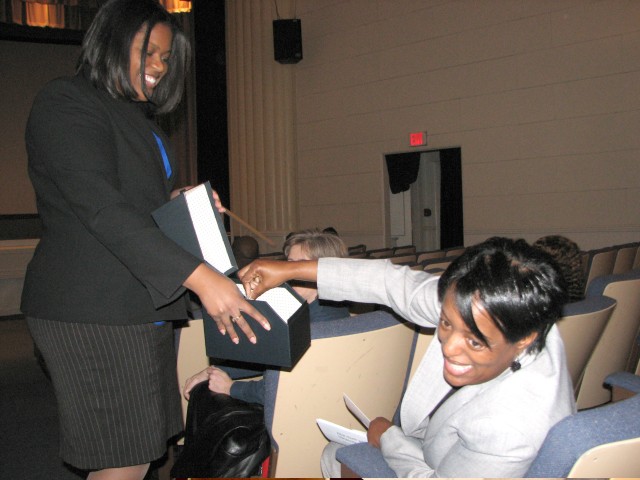
Tired of rising gas prices, traffic congestion and vehicle maintenance cost' Then perhaps vanpooling is right for you.
March 7, representatives from Enterprise and the Georgia Clean Air Commute (CAC) non-profit organization visited the Fort McPherson Post Theater to put on an educational presentation on the benefits of mass transit for federal employees.
Ebonie Hughes, Enterprise account executive, said the company is constantly looking to help people get involved in vanpooling and that those who do can reap benefits for themselves in the form of extra cash in their wallets.
"More people equals less expenses," she said, telling attendees that by vanpooling, fuel costs are split up amongst riders.
To illustrate her point, Hughes took attendees through real-life commuting scenarios. Armed with calculators, attendees were able to see how much money could be saved by using a vanpool. Besides fuel cost savings, Hughes said other expenses, such as vehicle maintenance and insurance, are taken care of by Enterprise.
Under the Enterprise Rideshare program, maintenance on vans rented from Enterprise is covered by the company. Additionally, any accidents that may occur while in an Enterprise van are covered by the company insurance and are not reported with driver's insurance company.
Additionally, many of the costs of vanpooling can be covered by vouchers from the mass transportation benefit program (MTBP).
Carolyn Stephens, Fort McPherson MTBP manager, said those enrolled in the MTBP can get vouchers for up to $230 to cover costs.
Money from the program comes from the Federal Department of Transportation (DoT) as part of an initiative to help reduce pollution and traffic congestion on the nation's roadways, Hughes said.
The effects of vanpooling on the environment is just as beneficial to it as vanpooling is on an individual's finances, Hughes said.
According to an Environmental Protection Agency 2005 study, personal vehicles account for 3.8 tons of carbon dioxide pollution per year. Each person using a vanpool reduces that amount of pollution by taking their car off the road, Hughes said.
As further incentive to save the environment by vanpooling, those who vanpool or carpool are eligible for monthly drawings to win a $25 gift card when they log their daily commute with the CAC. Commuters can sign up for the program at www.logyourcommute.org.
For those wishing to join a vanpool, all the necessary forms can be found on the garrison portal at https://macgil.forscom.army.mil/drm/transportation/default.aspx, Stephens said.
Once enrolled, individuals can also look for vanpool opportunities at www.vanpool.com. At the website, riders can be matched with vanpools near them. Vanpools range in size from six to 15 riders.
Vanpools are constantly being formed, Hughes said, adding Enterprise covers all places in Georgia.
Recently, new vanpool opportunities have opened up from Atlanta to Warner Robbins Air Force Base and Fort Benning. For those afraid of emergencies popping up that might keep them stuck at work, individuals who vanpool are also put in the Atlanta Regional Commission Guaranteed Ride Home program, which grants individuals five cost-covered emergency rental vehicles or taxi rides per year to cover such emergencies.
Enterprise also matches those five opportunities for members who vanpool with them, rasing the total to 10. "There's a lot of benefits to vanpooling," Hughes said. "Vanpooling is great."
For more information on the Enterprise Rideshare program, contact Hughes at ebonie.a.hughes@erac.com.

Social Sharing